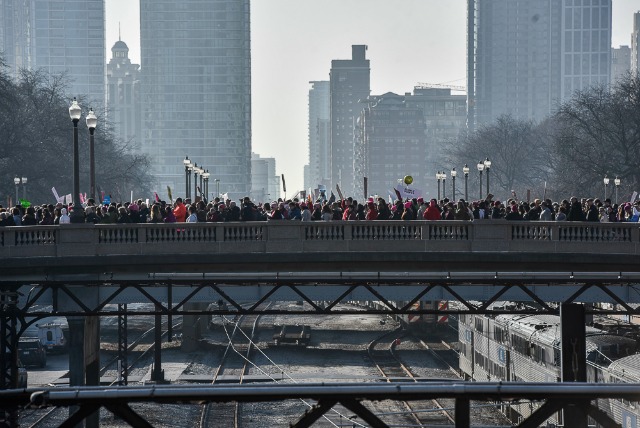Why We Shouldn't Valorize 'Zero Arrests' At The Women's March On Chicago
By Stephen Gossett in News on Jan 23, 2017 8:00PM

Women's March on Chicago / Photo: Tyler LaRiviere
Two hundred fifty thousand attendees. Zero arrests.
Both were remarkable figures for the momentous Women’s March on Chicago, which tripled an already sizable attendance forecast on Saturday, as people from all over the region flooded downtown to peacefully register protest one day after the inauguration of Donald Trump. Nationwide, in fact, not a single person was taken into custody in the nation’s largest cities.
But an over-focus on that detail, in Chicago and elsewhere, belies the fact that arrests made at protests are hardly all just and that moral law-breaking, when necessary, is a cornerstone tenant of civil disobedience.
The reminder came forcefully and eloquently from Chicago’s progressive activist wing shortly after the rally. Local politically-focused rapper Mykele Deville noted the dangerous line between respectability and docility, pointing out a particularly egregious quote from a Maryland resident who attended the New York rally. “This is not about people doing stupid stuff and getting arrested,” Robin Gilmore said, according to NBC New York. “Really, the police are cooperating. This couldn't happen without police cooperation."
Deville posted in response:
“Calling arrests in protests "stupid" only serves to keep a people passive, support the actions of the police, and defecates on the legacy of those who defied law to bring about change through civil disobedience, property damage and armed direct action”
Others highlighted how people of color in particular are often targeted by police at demonstrations. “Me and other black people of all genders have been to many marches & protests where we were peaceful, yet unduly criminalized,” wrote Eve Ewing, a prominent essayist and sociologist of education at the University of Chicago, on Twitter the day after the rally. “I've had more than one friend targeted by police and literally be just standing there, then get snatched out of a protest and arrested. Black people are surveilled, criminalized & presumed a violent threat to property & white civil society. No matter how peaceful the march. Not getting arrested in a march doesn't mean you're better than anybody. The police state doesn't deem you a threat. So slow your roll."
“Forms of protest that are intentionally disruptive are not somehow morally inferior to big marches,” Ewing added. One thinks of just one day prior, when PNC bank windows were smashed on Michigan Ave. during protests which saw at least 15 people arrested, according to the National Lawyers Guild of Chicago. You can debate the ethics, but it hardly seemed indiscriminate, as PNC is a known funder of the Dakota Access Pipeline.
The Women's March rally of course took place less than a week removed from Martin Luther King Jr. Day. Excerpts from Dr. King’s "Letter From a Birmingham Jail" were widely shared that Monday, arguably the most instructive passages being those which defended ethical legal violation.
"You express a great deal of anxiety over our willingness to break laws. This is certainly a legitimate concern. Since we so diligently urge people to obey the Supreme Court's decision of 1954 outlawing segregation in the public schools, at first glance it may seem rather paradoxical for us consciously to break laws. One may well ask: "How can you advocate breaking some laws and obeying others?" The answer lies in the fact that there are two types of laws: just and unjust. I would be the first to advocate obeying just laws. One has not only a legal but a moral responsibility to obey just laws. Conversely, one has a moral responsibility to disobey unjust laws. I would agree with St. Augustine that "an unjust law is no law at all."
We would all do well to agree.